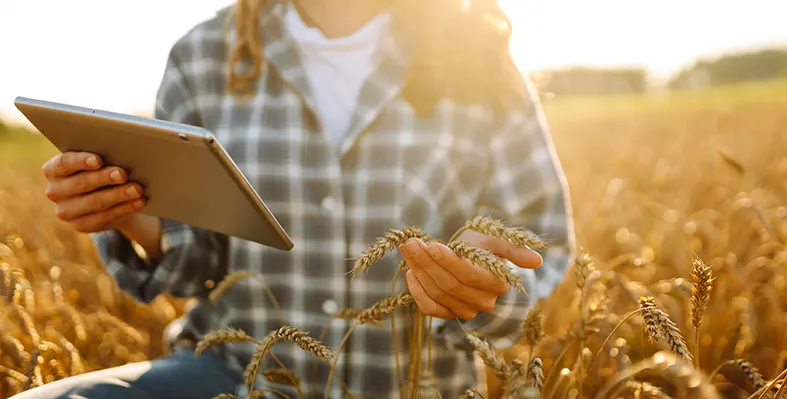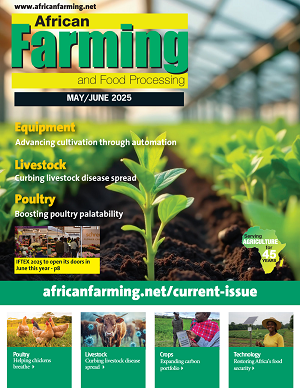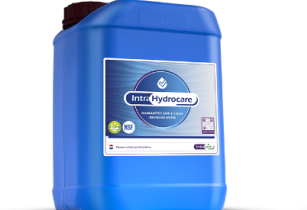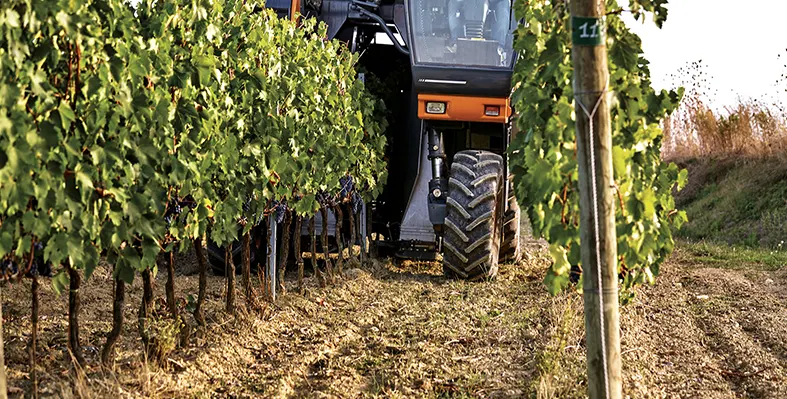The 11th edition of Agrofood Nigeria 2026 will be held from 24th to 26th March at the Landmark Centre in Lagos.
This major event highlights the growing momentum of Nigeria's agrofood sector, offering a unique platform for industry leaders, suppliers, and professionals across the entire value chain to come together.
Organised by Fairtrade Messe in collaboration with Modion Communications, Agrofood Nigeria 2026 is set to be a key event, drawing thousands of participants from across Nigeria and West Africa. It will showcase innovation and provide opportunities for networking, business development, and knowledge sharing. This year’s event features focused partial fairs, offering specialised experiences in agriculture, food + bev tech, food ingredients, packaging, and food + hospitality. This allows professionals to explore specific sectors in depth.
A highlight of the 2026 edition is the Netherlands as the guest of honour, marking the strong partnership between Nigeria and the Netherlands in the agrofood sector. This special designation will promote Dutch expertise and create valuable opportunities for collaboration between the two nations' agricultural stakeholders.
Key features of Agrofood Nigeria 2026 include:
- Increased regional reach with attendees from across West and Central Africa.- Government participation, including ministries from both federal and Lagos State governments, demonstrating strong support for the event.
- National pavilions from countries such as China, Germany, Italy, the Netherlands, and South Africa, highlighting international collaboration.
- Over 100 global exhibitors showcasing tailored products and solutions for the Nigerian market.
- Insightful conference sessions, building on the success of 2025 with more speakers and networking opportunities.
- Co-location with WACCSE, promoting advancements in West Africa’s cold chain sector, enhancing technology and cooperation.
With support from over 20 respected organisations, including government agencies, international chambers, and trade bodies, Agrofood Nigeria 2026 cements its position as West Africa’s leading platform for innovation in the agrofood and packaging sectors.
Nigeria’s growing agrofood sector is reflected in its significant investments in food and packaging technology, making it one of Africa’s largest importers in this field. The Nigerian food market is projected to reach US$233.53bn by end of 2025, with a steady annual growth rate of over 10%, further boosting the importance of this key event.
In The Spotlight
Bishoftu Polytechnic College in Ethiopia is making significant contributions to the country's agricultural modernisation by developing locally made threshing machines
These machines aim to boost post-harvest productivity and reduce farmers' reliance on expensive imported equipment.
Workaferaw Shafi, a trainer at the college, told The Ethiopian Herald that this initiative is a direct response to the government's call for innovation-driven agricultural development. The college has designed and built a thresher capable of processing and cleaning 10 to 15 quintals of crops per hour. This locally fabricated machine provides an affordable and efficient alternative to the costly combine harvesters often used by farmers.
Workaferaw said, "This machine performs all the essential functions of a combine but at a fraction of the cost. It opens up enormous opportunities for small and medium-scale farmers to improve efficiency, reduce post-harvest losses, and expand their operations."
The rising costs of imported combines have become a heavy burden for many Ethiopian farmers. By producing agricultural machinery locally, Bishoftu Polytechnic is reducing these financial challenges and fostering a generation of homegrown innovators who can address the country's agricultural needs.
Workaferaw emphasised that the college's efforts align with Ethiopia’s national priorities of accelerating agricultural development and ensuring food security. "We are committed to empowering farmers with affordable and practical tools that meet their everyday needs. Our work goes hand in hand with the government's strategy to modernise agriculture and create self-reliant farming communities," he said.
In addition to machinery development, the college collaborates with the Ministry of Agriculture to offer training in compost fertilizer application and entrepreneurial skills. These initiatives help farmers increase their productivity and adopt more sustainable farming practices. The college also invests in research and development, focusing on both pre-harvest and post-harvest technologies to address challenges in the agricultural sector.
Workaferaw also highlighted the importance of vocational education and training (TVET) in driving economic growth. "Participation in national skills competitions enables the institution to showcase its innovations while demonstrating that TVET can play a pivotal role in solving real-world problems and driving economic growth.We believe that every stakeholder has a responsibility to help transform Ethiopia's agricultural landscape.With the right investment in technical education and innovation, we can unlock the full potential of our agriculture and improve the livelihoods of countless farmers," Workaferaw added.
Bishoftu Polytechnic College is emerging as a model institution, showing how technical education and innovation can contribute to Ethiopia’s development and rural prosperity.
Nigeria's ministry of livestock development is working with state governments, experts, and international partners to modernise the livestock sector and ensure sustainable pasture and fodder for farmers.
The new initiative, supported by the L-PRES project, aims to tackle the challenges facing pasturelands, including overgrazing, land degradation, and climate change.
A meeting held in Abuja brought together stakeholders from various sectors, including state governments, livestock experts, the World Bank, and the Israeli ministry of agriculture. The event, organized by L-PRES, focused on "technologies for sustainable pasture production and management in Nigeria."
Idi Mukhtar Maiha, minister of livestock development, said, "As we confront pressing challenges ranging from overgrazing and climate stress to rising tensions over scarce pasture resources, it has become evident that innovation and collaboration must be our most potent tools." He further highlighted that managing pasture sustainably is not just an agricultural issue but a means to promote environmental stewardship, social stability, and economic resilience.
Sanusi Abubakar, national coordinator of the L-PRES project, pointed out that pasturelands are essential for livestock production but face growing threats and said, "These challenges not only affect productivity but also contribute to conflicts over scarce resources." Nigeria is now looking at climate-smart and technology-driven solutions to restore and sustainably manage its pasture ecosystems.
The meeting explored various innovative technologies, such as GIS, remote sensing, and precision irrigation, to improve pasture management. Experts also discussed best practices in rangeland and soil health management, sustainable pasture enterprises, and policy frameworks for long-term success.
Israel expressed its commitment to supporting Nigeria’s livestock sector. Daniel Werner, head of foreign relations of Israeli ministry of agriculture, said,"Israel has developed technologies that can help modernize Nigeria's livestock sector."
Livestock farmers welcomed the initiative but called for a sustainable development model that benefits both farmers and investors. Alhaji Ibrahim Usman Jibril, the Emir of Nasarawa, urged experts to avoid past mistakes, such as those made with cassava farming, where farmers were encouraged to invest without sufficient market opportunities.
Some L-PRES participating states, like Borno and Gombe, have appealed to investors by offering incentives, such as free land ownership titles in Borno for anyone interested in investing in the state's 180 square kilometres of grazing land.
Hussein Bashe, Tanzania's minister of agriculture has launched a new digital agricultural extension system called e-Kilimo (Digital Extension) to enhance services for farmers and ensure better accountability among agricultural extension officers nationwide.
The system was officially introduced on July 16, 2025, at the Mtanana Crop Innovation Center in Kongwa District.
Bashe explained that the e-Kilimo system will allow farmers to easily access information about the number of extension officers in their area, their locations, and contact details. This will help farmers connect with the right people for support and advice.
In addition, the system requires every extension officer to complete a service performance form. This will be used to evaluate their effectiveness at the end of each year, helping to identify officers who are doing their jobs well and take corrective action against those who fail to meet their responsibilities.
Bashe also emphasized that the system aims to encourage accountability among extension officers and improve the security of agricultural input distribution. The ministry of agriculture plans to register input sellers to ensure that if counterfeit inputs are sold to farmers, it will be easier to trace the responsible parties and take necessary actions.
Overall, the e-Kilimo system is expected to improve the transparency and efficiency of agricultural services in Tanzania, making it easier for farmers to get the help they need and ensuring that extension services are delivered effectively.
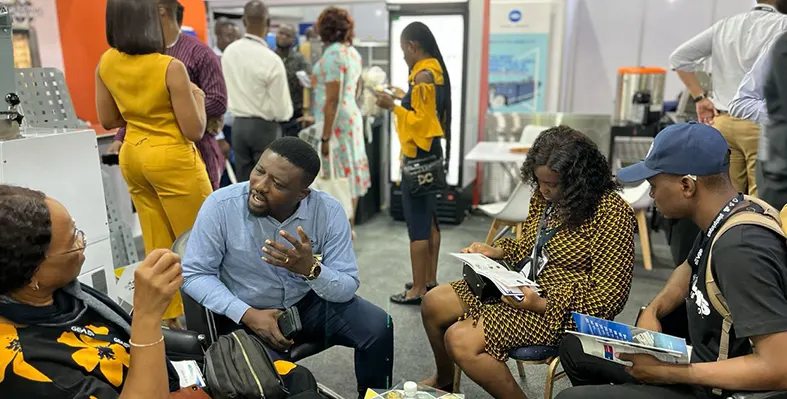
The 11th edition of Agrofood Nigeria will take place in March 2026. (Image credit: Agrofood Nigeria)
The 11th edition of Agrofood Nigeria 2026 will be held from 24th to 26th March at the Landmark Centre in Lagos.
This major event highlights the growing momentum of Nigeria's agrofood sector, offering a unique platform for industry leaders, suppliers, and professionals across the entire value chain to come together.
Organised by Fairtrade Messe in collaboration with Modion Communications, Agrofood Nigeria 2026 is set to be a key event, drawing thousands of participants from across Nigeria and West Africa. It will showcase innovation and provide opportunities for networking, business development, and knowledge sharing. This year’s event features focused partial fairs, offering specialised experiences in agriculture, food + bev tech, food ingredients, packaging, and food + hospitality. This allows professionals to explore specific sectors in depth.
A highlight of the 2026 edition is the Netherlands as the guest of honour, marking the strong partnership between Nigeria and the Netherlands in the agrofood sector. This special designation will promote Dutch expertise and create valuable opportunities for collaboration between the two nations' agricultural stakeholders.
Key features of Agrofood Nigeria 2026 include:
- Increased regional reach with attendees from across West and Central Africa.
- Government participation, including ministries from both federal and Lagos State governments, demonstrating strong support for the event.
- National pavilions from countries such as China, Germany, Italy, the Netherlands, and South Africa, highlighting international collaboration.
- Over 100 global exhibitors showcasing tailored products and solutions for the Nigerian market.
- Insightful conference sessions, building on the success of 2025 with more speakers and networking opportunities.
- Co-location with WACCSE, promoting advancements in West Africa’s cold chain sector, enhancing technology and cooperation.
With support from over 20 respected organisations, including government agencies, international chambers, and trade bodies, Agrofood Nigeria 2026 cements its position as West Africa’s leading platform for innovation in the agrofood and packaging sectors.
Nigeria’s growing agrofood sector is reflected in its significant investments in food and packaging technology, making it one of Africa’s largest importers in this field. The Nigerian food market is projected to reach US$233.53bn by end of 2025, with a steady annual growth rate of over 10%, further boosting the importance of this key event.
Nigeria's ministry of livestock development is working with state governments, experts, and international partners to modernise the livestock sector and ensure sustainable pasture and fodder for farmers.
The new initiative, supported by the L-PRES project, aims to tackle the challenges facing pasturelands, including overgrazing, land degradation, and climate change.
A meeting held in Abuja brought together stakeholders from various sectors, including state governments, livestock experts, the World Bank, and the Israeli ministry of agriculture. The event, organized by L-PRES, focused on "technologies for sustainable pasture production and management in Nigeria."
Idi Mukhtar Maiha, minister of livestock development, said, "As we confront pressing challenges ranging from overgrazing and climate stress to rising tensions over scarce pasture resources, it has become evident that innovation and collaboration must be our most potent tools." He further highlighted that managing pasture sustainably is not just an agricultural issue but a means to promote environmental stewardship, social stability, and economic resilience.
Sanusi Abubakar, national coordinator of the L-PRES project, pointed out that pasturelands are essential for livestock production but face growing threats and said, "These challenges not only affect productivity but also contribute to conflicts over scarce resources." Nigeria is now looking at climate-smart and technology-driven solutions to restore and sustainably manage its pasture ecosystems.
The meeting explored various innovative technologies, such as GIS, remote sensing, and precision irrigation, to improve pasture management. Experts also discussed best practices in rangeland and soil health management, sustainable pasture enterprises, and policy frameworks for long-term success.
Israel expressed its commitment to supporting Nigeria’s livestock sector. Daniel Werner, head of foreign relations of Israeli ministry of agriculture, said,"Israel has developed technologies that can help modernize Nigeria's livestock sector."
Livestock farmers welcomed the initiative but called for a sustainable development model that benefits both farmers and investors. Alhaji Ibrahim Usman Jibril, the Emir of Nasarawa, urged experts to avoid past mistakes, such as those made with cassava farming, where farmers were encouraged to invest without sufficient market opportunities.
Some L-PRES participating states, like Borno and Gombe, have appealed to investors by offering incentives, such as free land ownership titles in Borno for anyone interested in investing in the state's 180 square kilometres of grazing land.
Farmers in Bauchi State have expressed serious concerns about the sharp increase in fertiliser prices during this year’s planting season
Many say they have been forced to stop cultivating rice and maize due to the high cost and are now turning to crops that need little or no fertiliser.
Several farmers in Bauchi spoke out, warning that if urgent steps are not taken, the country could face a serious food crisis. A market survey at Bauchi Central and Muda Lawal markets shows that fertiliser prices have risen by roughly 15% since the season began.
Currently, a 50kg bag of NPK fertiliser is selling between N30,000 and N60,000, compared to N23,000 to N50,000 at the beginning of the season. The price of urea has also jumped from N35,000 to between N47,000 and N50,000, depending on the quality.
Mr. Audu Simon, a maize farmer, said that the increased costs have made it unprofitable to grow fertiliser-intensive crops like rice and maize. As a result, many are switching to millet, sorghum, soybeans, groundnuts, and beans. "We sold our produce at a loss last season, and we can’t afford fertiliser prices now," he said.
Marka Abass, the spokesperson for the Small Scale Women Farmers Organisation of Nigeria, stated that many women farmers are abandoning rice and maize in favour of growing vegetables, which are less dependent on fertiliser. She believes the price hike is due to low supply despite government intervention efforts."The trend had forced most women farmers to abandon maize and rice cultivation and embrace vegetable production," said Abass.
Usman Umar, a representative of the All Farmers’ Association of Nigeria, urged both the state and federal governments to take immediate action to stabilise fertiliser prices. He warned that if left unchecked, the high prices could severely affect national food security. "We need urgent intervention. If this continues, its implications on national food security will be severe," said Umar.
Meanwhile, Aliyu Gital, Bauchi State Commissioner for Agriculture and Food Security, said the Bauchi Fertiliser Blending Company has scaled up its production to meet the rising demand and help improve farmers’ access to fertiliser.
Sugarcane farmers in Chiredzi, Zimbabwe, are set to benefit from a major power upgrade
The Zimbabwe Electricity Transmission and Distribution Company (ZETDC), a subsidiary of ZESA, is building a new 330 kilovolt (kV) power line from Mutare to Chiredzi. This project aims to improve electricity supply for farmers who have long suffered from power shortages due to old and broken infrastructure.
Abel Gurupira, acting managing director for ZETDC told the Parliamentary Portfolio Committee on Industry and Commerce that the new line will connect Orange Grove in Mutare to Triangle in the Lowveld. This will help bring power from Mozambique, through Mutare, to sugar-producing areas. He said,“This will boost power capacity in farming areas where farmers urgently need electricity."
To support agricultural production, ZETDC is also working closely with wheat, tobacco, and sugarcane farmers. Gurupira stated that the company ensures no load-shedding during critical farming seasons, particularly for organised clusters that rely on irrigation.
John Chikeya, ZETDC’s commercial services manager, highlighted ongoing problems such as infrastructure vandalism. However, he noted that the company is working hard to restore damaged infrastructure to improve power reliability.
He added that smart technology is being introduced to support this goal. “We are rolling out a smart grid project with smart water reclosers and smart metres,” said Chikeya. These tools will allow ZETDC to manage power supply more efficiently, ensuring that sugar millers and irrigators receive power even during shortages. Smart metres and motorised circuit breakers (MCCBs) will also allow for selective power distribution.
Chiredzi is also part of a plan to support solar energy projects, with the private sector encouraged to build solar plants for commercial and industrial use. Farmers with good credit ratings are expected to benefit the most from these solar initiatives.
Other upgrades include improving old power infrastructure, increasing substation capacity in Chiredzi Town, and restoring capacitor banks and local substations. These efforts aim to support the entire sugarcane value chain and improve the area’s energy reliability.
John Chikeya concluded, “This power upgrade is not just about supply — it’s about securing the future of sugar farming in Chiredzi by building strong, reliable infrastructure.”










